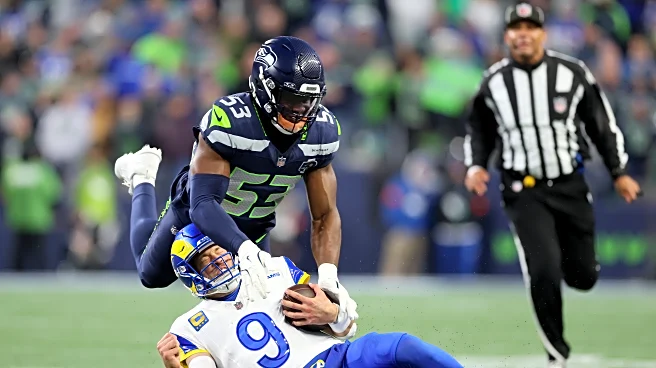What's Happening?
Emeka Egbuka, a rookie wide receiver for the Tampa Bay Buccaneers, has been experiencing limited playing time during the Monday Night Football game against the Detroit Lions. Despite being active for the game, Egbuka's participation has been restricted
due to a hamstring injury sustained in Week 6. Although he managed to participate in a limited practice session on Saturday, the coaching staff has opted to keep him on the sidelines for most early downs, allowing him to play primarily during third-down situations. This decision appears to be influenced by both medical and coaching considerations, as the team aims to manage his injury while still utilizing his skills in critical moments.
Why It's Important?
The decision to limit Emeka Egbuka's playing time highlights the challenges teams face in balancing player health with competitive performance. For the Buccaneers, managing Egbuka's injury is crucial to ensuring his long-term availability and effectiveness. This approach reflects a broader trend in the NFL where player safety is increasingly prioritized, potentially affecting team dynamics and game strategies. The Buccaneers' cautious handling of Egbuka's situation may influence other teams facing similar dilemmas, emphasizing the importance of strategic player management in maintaining a competitive edge while safeguarding athlete welfare.
What's Next?
As the Buccaneers continue their season, monitoring Emeka Egbuka's recovery will be essential. The team's medical staff will likely assess his condition closely to determine his readiness for future games. Depending on his recovery progress, Egbuka's role may expand in upcoming matches, potentially impacting the Buccaneers' offensive strategies. Additionally, the team's approach to managing Egbuka's injury could set a precedent for handling similar situations with other players, influencing league-wide practices regarding player health and game participation.
Beyond the Headlines
The situation with Emeka Egbuka underscores the evolving nature of player management in professional sports, where health considerations are increasingly integrated into strategic decisions. This development may lead to broader discussions about the ethical responsibilities of teams in protecting player health, potentially influencing league policies and public perceptions of athlete welfare. As teams navigate these complexities, the balance between competitive success and ethical considerations will remain a critical aspect of professional sports management.















